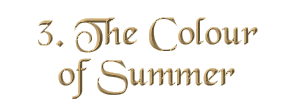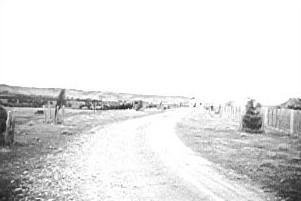















 
Springhill School was the best school, and Mr Calvin Allen was the best and only teacher. The school had been there since 1918. In 1955 there were about twenty-five pupils. That year saw the introduction of the school bus, but the horse paddock stayed.  Mr Calvin Allen  Springhill School  First day at school Annette Cheer, Me, Michael Satchwell But I jump ahead. Mr Allen would pick us up at the gate in the school bus after doing Blackburn and Hinerua, then down to Pendle Hill before coming back for us. The school was a single classroom with four great liftup windows and a fireplace and a porch and a single room to the side where Mr Allen lived. He didn't even have a toilet. Our house had a toilet, and later when Dad built a new house, we had two toilets. In fact, in our new house our toilet was blue. As was the basin and bath. Dad's brother, Uncle Roy, was now the plumber at Trentham, and when the Queen came to the races he imported a blue toilet, basin and bath from England - in case the Queen wanted to have a quick bath during the races. Anyway, he ordered a spare set for Dad, and apart from the Queen, we were the only ones in the country with a blue dunny. "Don't call it a dunny, dear. It's a toilet". Dad put up the first wall frames of our new house on my seventh birthday. "It's your bedroom," said Dad. "Happy Birthday!" It was a really good present, but not half as good as what Hoppy done. "Did, dear. Not done." It was not half as good as what Hoppy done. Hoppy was a chook with only one leg, and on my birthday (how did she know I wonder?) she hatched out twelve chickens. All grew into roosters, so we ate them and a few months later shifted into our new house.  The new drive then  The drive now And so the time passed - marked by chicken pox, measles and mumps, and measured by the school terms and the comings and goings of older brothers and sisters at boarding schools. Tony had boarded at Silverstream and Suzanne at Napier. Then Tony was at varsity and studying to be a vet, and Rick was at Silverstream. School seemed always summer. Sometimes in the afternoons Mr Allen would bus us to Onga Onga where we'd learn water skills in the baths and get a certificate. And on some afternoons we'd go for nature study walks, or paper chases through farmers' farms, and catch cockabullies and water nymphs and boatmen, and geckos that had babies. Mr Allen would whistle like a farmer when it was time to come inside. The school never had a bell, only Mr Allen's whistling. On noisy days Mr Allen would say, "You can't go outside till you hear a pin drop," and the room would go into a huge hush, because we knew he had a pin in his hand to drop on the fire place once all was quiet. Or he'd say about 2.30 that we couldn't go until someone spelt "Wednesday" or "February" - knowing that it would take until three o'clock to get it right. Then into the school bus, on a lazy day with the First Aid Kit on the accelerator least we get home too early, for more play with France and Leo and jobs from the list Mum had made.  Leo, Francie, Me Once a month, on a Friday night, we'd go into Waipukurau to get groceries. We got dressed up to go shopping, and were always given a penny. In those days you could get an ice-cream for half a penny - a wee one in a special cone - or you could get a gob-stopper for a whole penny. Gob-stoppers were best because they'd last and change colour like the seasons from green to red to blue to white. And when the colour of summer came, you could wrap it up carefully in your hanky, and hold it forever in your pocket. Return to the Previous Chapter Return Home Contact the Author |